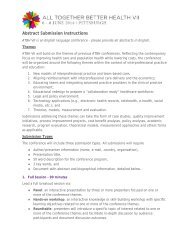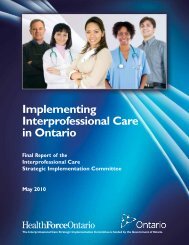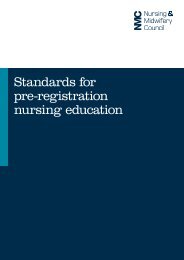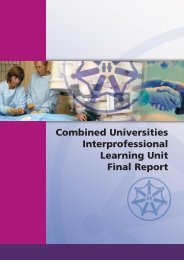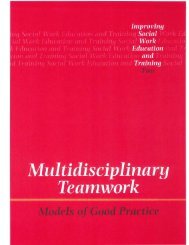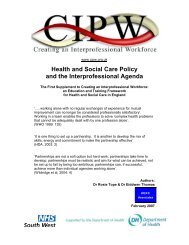Interprofessional Mentoring Guide - Alberta Health Services
Interprofessional Mentoring Guide - Alberta Health Services
Interprofessional Mentoring Guide - Alberta Health Services
You also want an ePaper? Increase the reach of your titles
YUMPU automatically turns print PDFs into web optimized ePapers that Google loves.
II<br />
IP <strong>Mentoring</strong><br />
Section II<br />
<strong>Interprofessional</strong> <strong>Mentoring</strong><br />
<strong>Interprofessional</strong> mentoring encourages professional<br />
exchanges between students and staff from different<br />
disciplines to enhance students’ competencies for<br />
collaborative practice. Besides their discipline-specific<br />
supervisors, students at practice sites can rely on team<br />
members from other disciplines to act as interprofessional<br />
mentors. Together, the discipline-specific supervisors and<br />
interprofessional mentors share the responsibility for<br />
meeting students’ interprofessional learning objectives.<br />
As a shared approach to student practice education,<br />
interprofessional mentoring lessens the burden on<br />
individual staff members and fosters a collaborative<br />
mentorship culture.<br />
In interprofessional mentoring, the roles of supervisors and<br />
other healthcare practitioners are to:<br />
“facilitate interprofessional learning and<br />
supervise and evaluate students’ interprofessional<br />
competencies within the practice setting.”<br />
(Adapted from Marshall & Gordon 2005)<br />
Expectations of<br />
<strong>Interprofessional</strong> Mentors<br />
Each interprofessional mentor is responsible for<br />
facilitating, supervising, and evaluating students from<br />
different disciplines. The interprofessional mentor<br />
facilitates interprofessional learning opportunities<br />
by engaging students in activities that illustrate their<br />
professional roles and collaboration with others. The<br />
interprofessional mentor can assist a student to set learning<br />
goals and expectations for these interprofessional learning<br />
opportunities. The learning goals should link directly to the<br />
interprofessional competencies.<br />
<strong>Interprofessional</strong> mentors supervise students during<br />
the interprofessional learning activities. Debriefings<br />
are a crucial part of supervising students by helping<br />
them examine collaborative practice: the role of various<br />
providers in delivering services, gaps in available services,<br />
the involvement of clients, the level of collaboration<br />
between providers, systems issues, etc. Asking thoughtprovoking<br />
and critical questions about client care and team<br />
functioning becomes integral to the students’ learning.<br />
Having team members from different disciplines act as<br />
interprofessional mentors supports discipline-specific<br />
supervisors in their final task of evaluating students’<br />
collaborative accomplishments. While interprofessional<br />
mentors are not expected to evaluate students’ disciplinespecific<br />
competencies, they should be able to assess any<br />
progress students have made in the interprofessional<br />
competencies as outlined in the CIHC Competency<br />
Framework. Therefore, debriefing with students and<br />
evaluating their performance on interprofessional<br />
Expectations of IP Mentors






